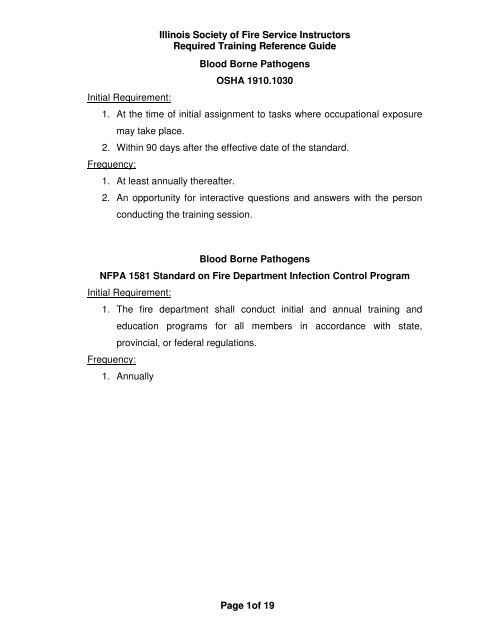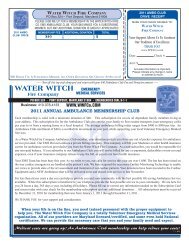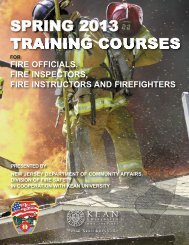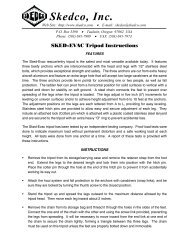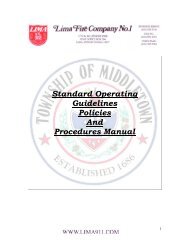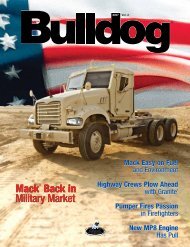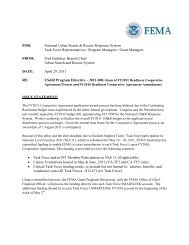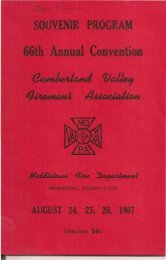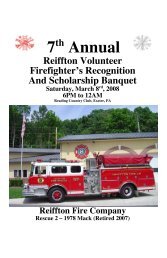Illinois Society of Fire Service Instructors Required Training ...
Illinois Society of Fire Service Instructors Required Training ...
Illinois Society of Fire Service Instructors Required Training ...
You also want an ePaper? Increase the reach of your titles
YUMPU automatically turns print PDFs into web optimized ePapers that Google loves.
Initial Requirement:<br />
<strong>Illinois</strong> <strong>Society</strong> <strong>of</strong> <strong>Fire</strong> <strong>Service</strong> <strong>Instructors</strong><br />
<strong>Required</strong> <strong>Training</strong> Reference Guide<br />
Blood Borne Pathogens<br />
OSHA 1910.1030<br />
1. At the time <strong>of</strong> initial assignment to tasks where occupational exposure<br />
may take place.<br />
2. Within 90 days after the effective date <strong>of</strong> the standard.<br />
Frequency:<br />
1. At least annually thereafter.<br />
2. An opportunity for interactive questions and answers with the person<br />
conducting the training session.<br />
Blood Borne Pathogens<br />
NFPA 1581 Standard on <strong>Fire</strong> Department Infection Control Program<br />
Initial Requirement:<br />
1. The fire department shall conduct initial and annual training and<br />
education programs for all members in accordance with state,<br />
provincial, or federal regulations.<br />
Frequency:<br />
1. Annually<br />
Page 1<strong>of</strong> 19
<strong>Illinois</strong> <strong>Society</strong> <strong>of</strong> <strong>Fire</strong> <strong>Service</strong> <strong>Instructors</strong><br />
<strong>Required</strong> <strong>Training</strong> Reference Guide<br />
Respiratory Protection<br />
NFPA 1404 Standard for <strong>Fire</strong> <strong>Service</strong> Respiratory Protection<br />
Initial Requirement:<br />
1. The fire department shall establish training and education programs<br />
Frequency:<br />
that provide new members initial training, pr<strong>of</strong>iciency opportunities, and<br />
a method <strong>of</strong> skill and knowledge evaluation for duties assigned to the<br />
member prior to engaging in emergency operations (1500).<br />
1. Re-training shall be administered annually and when the following<br />
situations occur:<br />
2. Inadequacies in the members' knowledge or use <strong>of</strong> the respirator<br />
indicate that the member has not retained the requisite understanding<br />
or skill<br />
3. Any other situation arises in which re-training appears necessary to<br />
ensure safe respirator use<br />
Respiratory Protection<br />
OSHA 1910.134 Respiratory Protection Standard<br />
Initial Requirement:<br />
1. The employer shall provide the training prior to requiring the employee<br />
to use a respirator in the workplace.<br />
Frequency:<br />
1. Retraining shall be administered annually, and when the following<br />
situations occur:<br />
2. Changes in the workplace or the type <strong>of</strong> respirator render previous<br />
training obsolete;<br />
3. Inadequacies in the employee's knowledge or use <strong>of</strong> the respirator<br />
indicate that the employee has not retained the requisite understanding<br />
or skill; or<br />
4. Any other situation arises in which retraining appears necessary to<br />
ensure safe respirator use.<br />
Page 2<strong>of</strong> 19
<strong>Illinois</strong> <strong>Society</strong> <strong>of</strong> <strong>Fire</strong> <strong>Service</strong> <strong>Instructors</strong><br />
<strong>Required</strong> <strong>Training</strong> Reference Guide<br />
Respiratory Protection<br />
NFPA 1500 Standard on <strong>Fire</strong> Department Occupational Safety and<br />
Health<br />
Initial Requirements:<br />
1. The fire department shall provide training and education for all<br />
department members commensurate with the duties and functions that<br />
they are expected to perform.<br />
2. The fire department shall establish training and education programs<br />
that provide new members initial training, pr<strong>of</strong>iciency opportunities, and<br />
a method <strong>of</strong> skill and knowledge evaluation for duties assigned to the<br />
member prior to engaging in emergency operations.<br />
Frequency:<br />
1. The fire department shall develop a reoccurring pr<strong>of</strong>iciency cycle with<br />
the goal <strong>of</strong> preventing skill degradation and potential for injury and<br />
death <strong>of</strong> members.<br />
2. The fire department shall provide an annual skills check to verify<br />
minimum pr<strong>of</strong>essional qualifications <strong>of</strong> its members.<br />
Other:<br />
1. The respiratory protection training program shall meet the<br />
requirements <strong>of</strong> NFPA 1404, Standard for <strong>Fire</strong> <strong>Service</strong> Respiratory<br />
Protection <strong>Training</strong>.<br />
2. Members shall be tested and certified at least annually in the safe and<br />
proper use <strong>of</strong> respiratory protection equipment that they are authorized<br />
to use.<br />
Page 3<strong>of</strong> 19
Initial Requirement:<br />
<strong>Illinois</strong> <strong>Society</strong> <strong>of</strong> <strong>Fire</strong> <strong>Service</strong> <strong>Instructors</strong><br />
<strong>Required</strong> <strong>Training</strong> Reference Guide<br />
Respiratory Protection<br />
<strong>Illinois</strong> Department <strong>of</strong> Labor<br />
1. OSHA 1910.134 Respiratory Protection Standard<br />
Frequency:<br />
1. OSHA 1910.134 Respiratory Protection Standard<br />
2. 16 Hour Requirement from IDOL – Referenced from the document<br />
“Questions and answers with Mr. Juskenas” on file with the <strong>Illinois</strong><br />
<strong>Society</strong> <strong>of</strong> <strong>Fire</strong> <strong>Service</strong> <strong>Instructors</strong>.<br />
Page 4<strong>of</strong> 19
<strong>Illinois</strong> <strong>Society</strong> <strong>of</strong> <strong>Fire</strong> <strong>Service</strong> <strong>Instructors</strong><br />
<strong>Required</strong> <strong>Training</strong> Reference Guide<br />
Driver <strong>Training</strong><br />
NFPA 1451 Standard for a <strong>Fire</strong> <strong>Service</strong> Vehicle Operations <strong>Training</strong><br />
Initial Requirement:<br />
Program<br />
1. Members shall be provided with driver training and education<br />
appropriate for their duties and responsibilities before being permitted<br />
to operate fire department vehicles or apparatus.<br />
2. The fire department shall establish training and education programs<br />
Frequency:<br />
that provide new members initial training, pr<strong>of</strong>iciency opportunities, and<br />
a method <strong>of</strong> skill and knowledge evaluation for duties assigned to the<br />
member prior to engaging in emergency operations.<br />
1. The fire department shall develop a reoccurring pr<strong>of</strong>iciency cycle with<br />
the goal <strong>of</strong> preventing skill degradation and potential for injury and<br />
death <strong>of</strong> members (1500).<br />
2. The fire department shall provide an annual skills check to verify<br />
minimum pr<strong>of</strong>essional qualifications <strong>of</strong> its members (1500).<br />
3. Driver training shall be provided for all members as <strong>of</strong>ten as necessary<br />
to meet the applicable requirements <strong>of</strong> this chapter, but not less than<br />
twice each year.<br />
Other:<br />
1. Annual driver training shall include hands-on exercises, excluding<br />
virtual reality driver training simulator (DTS), using actual fire<br />
apparatus.<br />
2. Whenever new or unfamiliar vehicles are placed into service, training<br />
and education relating to those vehicles shall be provided for all<br />
affected members.<br />
Page 5<strong>of</strong> 19
<strong>Illinois</strong> <strong>Society</strong> <strong>of</strong> <strong>Fire</strong> <strong>Service</strong> <strong>Instructors</strong><br />
<strong>Required</strong> <strong>Training</strong> Reference Guide<br />
Driver <strong>Training</strong><br />
NFPA 1500 Standard on <strong>Fire</strong> Department Occupational Safety and<br />
Initial Requirement:<br />
Health<br />
1. The fire department shall establish training and education programs<br />
Frequency:<br />
that provide new members initial training, pr<strong>of</strong>iciency opportunities, and<br />
a method <strong>of</strong> skill and knowledge evaluation for duties assigned to the<br />
member prior to engaging in emergency operations.<br />
1. The fire department shall develop a reoccurring pr<strong>of</strong>iciency cycle with<br />
the goal <strong>of</strong> preventing skill degradation and potential for injury and<br />
death <strong>of</strong> members.<br />
2. The fire department shall provide an annual skills check to verify<br />
minimum pr<strong>of</strong>essional qualifications <strong>of</strong> its members.<br />
Driver <strong>Training</strong><br />
NFPA 1002 <strong>Fire</strong> Apparatus Driver / Operator Pr<strong>of</strong>essional Qualifications<br />
Initial Requirement:<br />
1. The fire department shall provide training and education for all<br />
department members commensurate with the duties and functions that<br />
they are expected to perform (1500).<br />
2. The fire department shall establish training and education programs<br />
that provide new members initial training, pr<strong>of</strong>iciency opportunities, and<br />
a method <strong>of</strong> skill and knowledge evaluation for duties assigned to the<br />
member prior to engaging in emergency operations (1500).<br />
Frequency:<br />
1. The fire department shall develop a reoccurring pr<strong>of</strong>iciency cycle with<br />
the goal <strong>of</strong> preventing skill degradation and potential for injury and<br />
death <strong>of</strong> members (1500).<br />
2. The fire department shall provide an annual skills check to verify<br />
minimum pr<strong>of</strong>essional qualifications <strong>of</strong> its members (1500).<br />
Page 6<strong>of</strong> 19
Initial Requirement:<br />
<strong>Illinois</strong> <strong>Society</strong> <strong>of</strong> <strong>Fire</strong> <strong>Service</strong> <strong>Instructors</strong><br />
<strong>Required</strong> <strong>Training</strong> Reference Guide<br />
1. 40 hours for new drivers.<br />
Frequency:<br />
Driver <strong>Training</strong><br />
ISO <strong>Fire</strong> Suppression Rating Schedule<br />
1. Four half day (3 hours) sessions per year.<br />
Driver <strong>Training</strong><br />
OSFM <strong>Fire</strong> <strong>Service</strong> Vehicle Operator<br />
Initial Requirement:<br />
1. 8 Hours Classroom Instruction<br />
2. 10 Hours Behind-the-Wheel on each vehicle the member is expected<br />
to operate.<br />
Frequency:<br />
1. Annual Recertification<br />
Pump Operator<br />
NFPA 1002 Standard on <strong>Fire</strong> Apparatus Driver/Operator Pr<strong>of</strong>essional<br />
Qualifications<br />
Initial Requirement:<br />
1. Must meet the job performance requirements defined in Sections 5.1<br />
and 5.2 shall be met prior to certification as a driver / operator -<br />
pumper.<br />
Frequency:<br />
1. The fire department shall develop a reoccurring pr<strong>of</strong>iciency cycle with<br />
the goal <strong>of</strong> preventing skill degradation and potential for injury and<br />
death <strong>of</strong> members.<br />
2. The fire department shall provide an annual skills check to verify<br />
minimum pr<strong>of</strong>essional qualifications <strong>of</strong> its members.<br />
Page 7<strong>of</strong> 19
Initial Requirement:<br />
<strong>Illinois</strong> <strong>Society</strong> <strong>of</strong> <strong>Fire</strong> <strong>Service</strong> <strong>Instructors</strong><br />
<strong>Required</strong> <strong>Training</strong> Reference Guide<br />
1. 40 hours for new drivers.<br />
Frequency:<br />
Pump Operator <strong>Training</strong><br />
ISO <strong>Fire</strong> Suppression Rating Schedule<br />
1. Four half day (3 hours) sessions per year.<br />
HazMat Operations <strong>Training</strong><br />
OSHA 1910.120 Hazardous Waste Operations and Emergency Response<br />
Initial Requirement:<br />
1. General site workers engaged in hazardous substance removal or<br />
other activities which expose or potentially expose workers to<br />
hazardous substances and health hazards shall receive a minimum <strong>of</strong><br />
40 hours <strong>of</strong> instruction <strong>of</strong>f the site,<br />
2. And a minimum <strong>of</strong> three days actual field experience under the direct<br />
supervision <strong>of</strong> a trained experienced supervisor.<br />
Frequency:<br />
1. Employees specified in paragraph (e)(1) <strong>of</strong> this section, and managers<br />
and supervisors specified in paragraph (e)(4) <strong>of</strong> this section, shall<br />
receive eight hours <strong>of</strong> refresher training annually on the items specified<br />
in paragraph (e)(2) and/or (e)(4) <strong>of</strong> this section, any critique <strong>of</strong><br />
incidents that have occurred in the past year that can serve as training<br />
examples <strong>of</strong> related work, and other relevant topics.<br />
Page 8<strong>of</strong> 19
Initial Requirement:<br />
1. None given<br />
Frequency:<br />
<strong>Illinois</strong> <strong>Society</strong> <strong>of</strong> <strong>Fire</strong> <strong>Service</strong> <strong>Instructors</strong><br />
<strong>Required</strong> <strong>Training</strong> Reference Guide<br />
HazMat Operations <strong>Training</strong><br />
ISO <strong>Fire</strong> Suppression Rating Schedule<br />
1. One half day (3 hours) per member per year<br />
HazMat <strong>Training</strong><br />
NFPA 1500 Standard on <strong>Fire</strong> Department Occupational Safety and<br />
Health Program<br />
Initial Requirement:<br />
1. The fire department shall provide specific training to members who are<br />
likely to respond to special operations incidents in a support role to<br />
special operations technicians.<br />
Frequency:<br />
1. The fire department shall provide training and education events as<br />
required to support minimum qualifications and certifications expected<br />
<strong>of</strong> its members.<br />
2. Members shall practice assigned skill sets on a regular basis but not<br />
less than annually.<br />
Page 9<strong>of</strong> 19
Initial Requirement:<br />
<strong>Illinois</strong> <strong>Society</strong> <strong>of</strong> <strong>Fire</strong> <strong>Service</strong> <strong>Instructors</strong><br />
<strong>Required</strong> <strong>Training</strong> Reference Guide<br />
Structural <strong>Fire</strong>fighting<br />
OSHA 1910.156 <strong>Fire</strong> Brigade Standard<br />
1. The employer shall provide training and education for all fire brigade<br />
members commensurate with those duties and functions that fire<br />
brigade members are expected to perform.<br />
2. Such training and education shall be provided to fire brigade members<br />
Frequency:<br />
before they perform fire brigade emergency activities.<br />
1. The employer shall assure that training and education is conducted<br />
frequently enough to assure that each member <strong>of</strong> the fire brigade is<br />
able to perform the member's assigned duties and functions<br />
satisfactorily and in a safe manner so as not to endanger fire brigade<br />
members or other employees.<br />
2. All fire brigade members shall be provided with training at least<br />
annually.<br />
3. In addition, fire brigade members who are expected to perform interior<br />
structural fire fighting shall be provided with an education session or<br />
training at least quarterly.<br />
Structural <strong>Fire</strong>fighting<br />
ISO <strong>Fire</strong> Suppression Rating Schedule<br />
Initial Requirement:<br />
1. 240 hours entry level training.<br />
Frequency:<br />
1. 20 hours per member per month continuing training.<br />
Page 10<strong>of</strong> 19
Initial Requirement:<br />
<strong>Illinois</strong> <strong>Society</strong> <strong>of</strong> <strong>Fire</strong> <strong>Service</strong> <strong>Instructors</strong><br />
<strong>Required</strong> <strong>Training</strong> Reference Guide<br />
Structural <strong>Fire</strong>fighting<br />
<strong>Illinois</strong> Department <strong>of</strong> Labor<br />
1. <strong>Training</strong> commensurate with duties.<br />
Frequency:<br />
1. Quarterly<br />
*Above information is from the Safety Inspection Division’s <strong>Fire</strong> Department Checklist.<br />
<strong>Fire</strong>fighter II<br />
NFPA 1001 Standard for <strong>Fire</strong> Fighter Pr<strong>of</strong>essional Qualifications<br />
Initial Requirement:<br />
1. Prior to being certified at the <strong>Fire</strong> Fighter I level; the fire fighter<br />
candidate shall meet the general knowledge and skills requirements<br />
and the job performance requirements <strong>of</strong> Chapter 5.<br />
2. The job performance requirements shall be accomplished in<br />
accordance with the requirements <strong>of</strong> the authority having jurisdiction<br />
and NFPA 1500.<br />
3. The fire department shall establish training and education programs<br />
that provide new members initial training, pr<strong>of</strong>iciency opportunities, and<br />
a method <strong>of</strong> skill and knowledge evaluation for duties assigned to the<br />
member prior to engaging in emergency operations.<br />
Frequency:<br />
1. The fire department shall develop a reoccurring pr<strong>of</strong>iciency cycle with<br />
the goal <strong>of</strong> preventing skill degradation and potential for injury and<br />
death <strong>of</strong> members (1500).<br />
2. The fire department shall provide an annual skills check to verify<br />
minimum pr<strong>of</strong>essional qualifications <strong>of</strong> its members.<br />
Page 11<strong>of</strong> 19
Requirement & Frequency:<br />
<strong>Illinois</strong> <strong>Society</strong> <strong>of</strong> <strong>Fire</strong> <strong>Service</strong> <strong>Instructors</strong><br />
<strong>Required</strong> <strong>Training</strong> Reference Guide<br />
Night <strong>Training</strong><br />
ISO <strong>Fire</strong> Suppression Rating Schedule<br />
Two drills <strong>of</strong> three (3) hours each per year.<br />
Incident Command <strong>Training</strong><br />
NFPA 1500 Standard on <strong>Fire</strong> Department Occupational Safety and<br />
Health Program<br />
Initial Requirement:<br />
1. All members who are likely to be involved in emergency operations<br />
shall be trained in the incident management and accountability system<br />
used by the fire department.<br />
Frequency:<br />
1. The fire department shall provide training and education events as<br />
required to support minimum qualifications and certifications expected<br />
<strong>of</strong> its members.<br />
2. Members shall practice assigned skill sets on a regular basis but not<br />
less than annually.<br />
Incident Command <strong>Training</strong><br />
NFPA 1021 Standard for <strong>Fire</strong> Officer Pr<strong>of</strong>essional Qualifications<br />
Initial Requirement:<br />
1. For certification at the <strong>Fire</strong> Officer Level I, the candidate shall meet the<br />
requirements <strong>of</strong> <strong>Fire</strong>fighter II as defined in NFPA 1001, <strong>Fire</strong> Instructor I<br />
as defined in NFPA 1041, and the job performance requirements<br />
defined in Sections 4.2 through 4.7 <strong>of</strong> this standard.<br />
Frequency:<br />
1. None Given<br />
Page 12<strong>of</strong> 19
<strong>Illinois</strong> <strong>Society</strong> <strong>of</strong> <strong>Fire</strong> <strong>Service</strong> <strong>Instructors</strong><br />
<strong>Required</strong> <strong>Training</strong> Reference Guide<br />
Incident Command <strong>Training</strong><br />
NFPA 1001 Standard for <strong>Fire</strong> Fighter Pr<strong>of</strong>essional Qualifications<br />
Initial Requirement:<br />
1. For certification at Level II, the <strong>Fire</strong> Fighter I shall meet the general<br />
knowledge requirements in 6.1.1.1, the general skill requirements in<br />
6.1.1.2, and the job performance requirements defined in Sections 6.2<br />
through 6.5 <strong>of</strong> this standard.<br />
2. Responsibilities <strong>of</strong> the <strong>Fire</strong> Fighter II in assuming and transferring<br />
Frequency:<br />
command within an incident management system, performing<br />
assigned duties in conformance with applicable NFPA and other safety<br />
regulations and authority having jurisdiction procedures, and the role <strong>of</strong><br />
a <strong>Fire</strong> Fighter II within the organization.<br />
1. The fire department shall develop a reoccurring pr<strong>of</strong>iciency cycle with<br />
the goal <strong>of</strong> preventing skill degradation and potential for injury and<br />
death <strong>of</strong> members (1500).<br />
2. The fire department shall provide an annual skills check to verify<br />
minimum pr<strong>of</strong>essional qualifications <strong>of</strong> its members.<br />
Incident Command <strong>Training</strong><br />
National Incident Management System<br />
Initial Requirement:<br />
1. Homeland Security Presidential Directive 5<br />
Frequency:<br />
1. Preparedness activities conducted on a “steady-state” basis.<br />
Page 13<strong>of</strong> 19
<strong>Illinois</strong> <strong>Society</strong> <strong>of</strong> <strong>Fire</strong> <strong>Service</strong> <strong>Instructors</strong><br />
<strong>Required</strong> <strong>Training</strong> Reference Guide<br />
Officer <strong>Training</strong><br />
NFPA 1021 Standard for <strong>Fire</strong> Officer Pr<strong>of</strong>essional Qualifications<br />
Initial Requirements:<br />
1. For certification at <strong>Fire</strong> Officer Level I, the candidate shall meet the<br />
Frequency:<br />
requirements <strong>of</strong>:<br />
a. <strong>Fire</strong> Fighter II as defined in NFPA 1001,<br />
b. <strong>Fire</strong> Instructor I as defined in NFPA 1041,<br />
c. And the job performance requirements defined in Sections 4.2<br />
1. None given.<br />
through 4.7 <strong>of</strong> this standard.<br />
Officer <strong>Training</strong><br />
ISO <strong>Fire</strong> Suppression Rating Schedule<br />
Initial Requirement:<br />
1. None given.<br />
Frequency:<br />
1. Two days per year per Officer.<br />
Page 14<strong>of</strong> 19
<strong>Illinois</strong> <strong>Society</strong> <strong>of</strong> <strong>Fire</strong> <strong>Service</strong> <strong>Instructors</strong><br />
<strong>Required</strong> <strong>Training</strong> Reference Guide<br />
Technical Rescue Awareness<br />
NFPA 1500 Standard on <strong>Fire</strong> Department Occupational Safety and<br />
Initial Requirement:<br />
Health Program<br />
1. The fire department shall provide specific training to members who are<br />
Frequency:<br />
likely to respond to special operations incidents in a support role to<br />
special operations technicians.<br />
1. The fire department shall provide training and education events as<br />
required to support minimum qualifications and certifications expected<br />
<strong>of</strong> its members.<br />
2. Members shall practice assigned skill sets on a regular basis but not<br />
less than annually.<br />
Technical Rescue Awareness<br />
OSHA 1910.156 <strong>Fire</strong> Brigade Standard<br />
Initial Requirement:<br />
1. The employer shall provide training and education for all fire brigade<br />
members commensurate with those duties and functions that fire<br />
brigade members are expected to perform.<br />
2. Such training and education shall be provided to fire brigade members<br />
before they perform fire brigade emergency activities.<br />
Frequency:<br />
1. The employer shall assure that training and education is conducted<br />
frequently enough to assure that each member <strong>of</strong> the fire brigade is<br />
able to perform the member's assigned duties and functions<br />
satisfactorily and in a safe manner so as not to endanger fire brigade<br />
members or other employees.<br />
2. All fire brigade members shall be provided with training at least<br />
annually.<br />
Page 15<strong>of</strong> 19
<strong>Illinois</strong> <strong>Society</strong> <strong>of</strong> <strong>Fire</strong> <strong>Service</strong> <strong>Instructors</strong><br />
<strong>Required</strong> <strong>Training</strong> Reference Guide<br />
3. In addition, fire brigade members who are expected to perform interior<br />
structural fire fighting shall be provided with an education session or<br />
training at least quarterly.<br />
Fit Testing<br />
OSHA 1910.134 Respiratory Protection Standard<br />
Initial Requirement:<br />
1. The employer shall ensure that an employee using a tight-fitting<br />
facepiece respirator is fit tested prior to initial use <strong>of</strong> the respirator,<br />
2. Whenever a different respirator facepiece (size, style, model or make)<br />
is used.<br />
Frequency:<br />
1. At least annually thereafter.<br />
Fit Testing<br />
NFPA 1500 Standard on <strong>Fire</strong> Department Occupational Safety and<br />
Health Program<br />
Initial Requirement:<br />
1. The fit <strong>of</strong> the respiratory protection equipment <strong>of</strong> each new member<br />
shall be tested before the members are permitted to use respiratory<br />
protection equipment in a hazardous atmosphere.<br />
2. Only members with a properly fitting facepiece shall be permitted by<br />
the fire department to function in a hazardous atmosphere with<br />
respiratory protection equipment.<br />
Frequency:<br />
1. The facepiece seal capability <strong>of</strong> each member qualified to use<br />
respiratory protection equipment shall be verified by qualitative or<br />
quantitative fit testing on an annual basis and<br />
2. Whenever new types <strong>of</strong> respiratory protection equipment or facepieces<br />
are issued.<br />
Page 16<strong>of</strong> 19
Initial Requirement:<br />
<strong>Illinois</strong> <strong>Society</strong> <strong>of</strong> <strong>Fire</strong> <strong>Service</strong> <strong>Instructors</strong><br />
<strong>Required</strong> <strong>Training</strong> Reference Guide<br />
Fit Testing<br />
OSHA 1910.156 <strong>Fire</strong> Brigade Standard<br />
1. The employer shall ensure that an employee using a tight-fitting<br />
facepiece respirator is fit tested prior to initial use <strong>of</strong> the respirator,<br />
2. Whenever a different respirator facepiece (size, style, model or make)<br />
is used.<br />
Frequency:<br />
1. At least annually thereafter.<br />
*Direct reference to 1910.134<br />
Hazard Communication<br />
OSHA 1910.1200<br />
Initial Requirement:<br />
1. Employers shall provide employees with effective information and<br />
training on hazardous chemicals in their work area at the time <strong>of</strong> their<br />
initial assignment, and<br />
2. Whenever a new physical or health hazard the employees have not<br />
previously been trained about is introduced into their work area.<br />
Frequency:<br />
Page 17<strong>of</strong> 19
Initial Requirement:<br />
<strong>Illinois</strong> <strong>Society</strong> <strong>of</strong> <strong>Fire</strong> <strong>Service</strong> <strong>Instructors</strong><br />
<strong>Required</strong> <strong>Training</strong> Reference Guide<br />
Confined Space <strong>Training</strong><br />
OSHA 1910.146 Permit <strong>Required</strong> Confined Spaces<br />
1. <strong>Training</strong> shall be provided to each affected employee:<br />
Frequency:<br />
a. Before the employee is first assigned duties under this section;<br />
b. Before there is a change in assigned duties;<br />
c. Whenever there is a change in permit space operations that<br />
presents a hazard about which an employee has not previously<br />
been trained;<br />
d. Whenever the employer has reason to believe either that there<br />
are deviations from the permit space entry procedures required<br />
by paragraph (d)(3) <strong>of</strong> this section or that there are<br />
inadequacies in the employee's knowledge or use <strong>of</strong> these<br />
procedures.<br />
1. Ensure that affected employees practice making permit space rescues<br />
at least once every 12 months, by means <strong>of</strong> simulated rescue<br />
operations in which they remove dummies, manikins, or actual persons<br />
from the actual permit spaces or from representative permit spaces.<br />
a. Representative permit spaces shall, with respect to opening size,<br />
configuration, and accessibility, simulate the types <strong>of</strong> permit spaces<br />
from which rescue is to be performed.<br />
Page 18<strong>of</strong> 19
Initial Requirement:<br />
<strong>Illinois</strong> <strong>Society</strong> <strong>of</strong> <strong>Fire</strong> <strong>Service</strong> <strong>Instructors</strong><br />
<strong>Required</strong> <strong>Training</strong> Reference Guide<br />
Personal Protective Equipment<br />
OSHA 1910.132 General Requirements<br />
1. The employer shall provide training to each employee who is required<br />
by this section to use PPE.<br />
2. Each affected employee shall demonstrate an understanding <strong>of</strong> the<br />
Frequency:<br />
training specified in paragraph (f)(1) <strong>of</strong> this section, and the ability to<br />
use PPE properly, before being allowed to perform work requiring the<br />
use <strong>of</strong> PPE.<br />
1. When the employer has reason to believe that any affected employee<br />
who has already been trained does not have the understanding and<br />
skill required by paragraph (f)(2) <strong>of</strong> this section, the employer shall<br />
retrain each such employee. Circumstances where retraining is<br />
required include, but are not limited to, situations where:<br />
a. Changes in the workplace render previous training obsolete; or<br />
b. Changes in the types <strong>of</strong> PPE to be used render previous<br />
training obsolete; or<br />
c. Inadequacies in an affected employee's knowledge or use <strong>of</strong><br />
assigned PPE indicate that the employee has not retained the<br />
requisite understanding or skill.<br />
Page 19<strong>of</strong> 19


